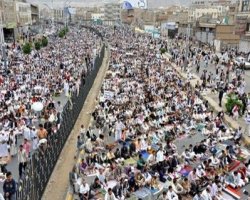Tariq Shami, a presidential aide, told Al Jazeera on Saturday that the president had agreed in full to a proposal from the Gulf Cooperation Council (GCC) for him to step down.
But he said the opposition must first agree to the deal in order for Saleh to accept the plan for a three-month transition of power.
Saleh, who has ruled the country for more than three decades, has been under pressure to step down ever since anti-government protests began several weeks ago.
The developments came a day after opponents and supporters of the Yemeni president flooded the streets of Sanaa, the capital, and the southern city of Taiz to stage rival demonstrations.
Friday's rallies took place as Saleh gave a guarded welcome to the GCC proposal, delivered to him the day before.
He told supporters in Sanaa that any arrangements had to be "within the framework of the Yemen constitution" - language which could mask objections to the plan. He also vowed to "confront challenge with challenge", but without bloodshed.
"Guns can be used today but you cannot use them to rule tomorrow. We reject war," he said.
Protesters demanding that Saleh quit dubbed the day "Last Chance Friday", while pro-government demonstrators called it "Reconciliation Friday".
In his address to his supporters, broadcast live on Yemeni state television, Saleh said: "We are keen to maintain the unity of the people and to avoid bloodshed ... and we will face them (anti-government protesters) without weapons.
"We need to make sure that we are rejecting bloodshed."
Framework of constitution
Saleh said that his government "welcom[ed]" the GCC's initiative, and that it would deal with it with "positively ... within the framework of the Yemeni constitution".
Meanwhile, Saleh's opponents took to the streets in central Sanaa to demand his immediate resignation.
Army and police personnel were deployed in force to prevent any clashes between the two demonstrations, each of which attracted thousands of supporters at squares just a few kilometres apart.
Thousands more anti-government demonstrators took part in the rally in Taiz, an opposition stronghold.
Amen al-Basha, the chairperson of the Arab Sisters Forum for Human Rights and a pro-democracy activist, told Al Jazeera that Saleh's "regime has lost the trust [of Yemenis]".
"It is the desire of the people, it is the will of the people, for Ali Abdullah Saleh to step down immediately," she said.
Pro-democracy protesters would not accept any plan that did not include this provision, she said.
Parliamentary opposition groups and Saleh's government have been mulling over the GCC plan under which Saleh would step down 30 days after the formation of a national unity government, but protesters in Sanaa say they reject such a plan.
"Neighbouring countries; no negotiations, no dialogue," read posters carried by anti-government demonstrators, apparently referring to the GCC plan, under which Saleh would transfer powers to Abdrabuh Mansur Hadi, the country's vice-president.
The Peaceful Youth Revolt, a group that has helped organise protests against Saleh's government, issued a statement rejecting the GCC initiative, saying "it does not include Saleh's immediate ouster", and "provides safeguards to him, his family and aides who are all killers".
Confrontations have raged on between security forces and anti-Saleh protesters in recent days, with medics and witnesses reporting that eight people have been shot dead since Tuesday, including a passer-by and a policeman.
GCC proposal
The plan formulated by Gulf Arab mediators calling for a three-month transition that would end with a presidential election was made public on Thursday by a government official.
According to the plan, a unity government led by the opposition would work to organise presidential elections within two months of Saleh's resignation. Saleh's term runs until 2013.
The GCC proposed "the formation of a national unity government with 50 per cent held by the ruling party, 40 per cent by the opposition and 10 per cent by other parties," an official said, who spoke on condition of anonymity, was quoted by the AFP news agency as saying.
A day earlier, Saleh said he would "resist" calls to resign and would abide by the constitution in any transfer of power.
Addressing a women's group in Sanaa on Wednesday, he reiterated he would relinquish power only through elections.
"We will continue to resist ... undaunted and committed to constitutional legitimacy, while rejecting the plots and coups," Saba news agency quoted Saleh as saying.
"Let those who want to attain power rely on the ballot box. Change can only come about through elections and within the framework of constitutional legitimacy."
Munir al-Mawri, a Yemeni-American journalist, told Al Jazeera that "Saleh will practically be unable to rule Yemen without the support of the GCC".
"He can try to buy time but he knows very well that he is losing and that he should leave as soon as possible," he said.
"He is concerned about the consequences after he leaves. He knows how many crimes he has committed in his country, especially after killing so many protesters. By asking for guarantees for not being prosecuted, he is admitting that he committed crimes."
Saleh, who has been in power since 1978, has faced protests since late January calling for his departure that have cost more than 130 lives.
PHOTO CAPTION
Tens of thousands of Yemeni anti-government protesters gather for an anti-regime demonstration calling for the ouster of Yemeni President Ali Abdullah Saleh following the weekly Muslim Friday prayers in Sanaa.
Al-Jazeera


 Home
Home Discover Islam
Discover Islam Quran Recitations
Quran Recitations Lectures
Lectures
 Fatwa
Fatwa Articles
Articles Fiqh
Fiqh E-Books
E-Books Boys & Girls
Boys & Girls  Ramadan
Ramadan Fatwa Audios
Fatwa Audios Month of Mercy
Month of Mercy Women
Women Eed Al- Fitr
Eed Al- Fitr Food Recipes
Food Recipes Videos
Videos

 Prayer Times
Prayer Times












